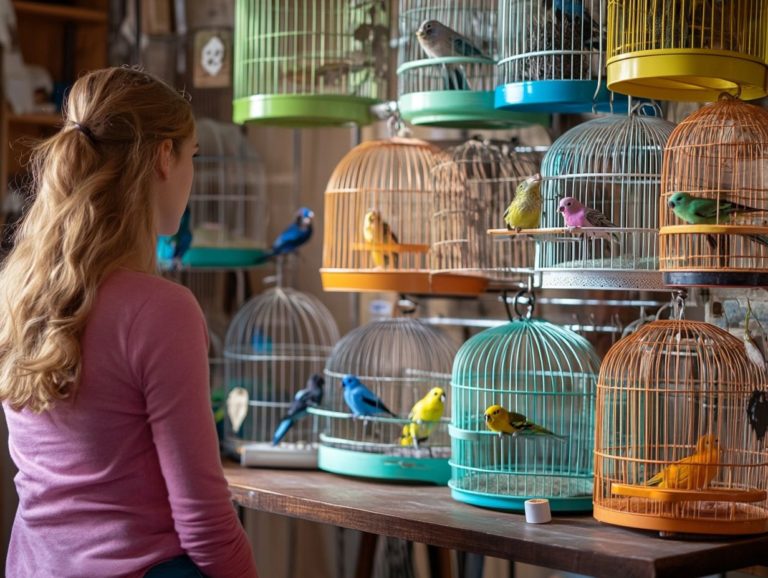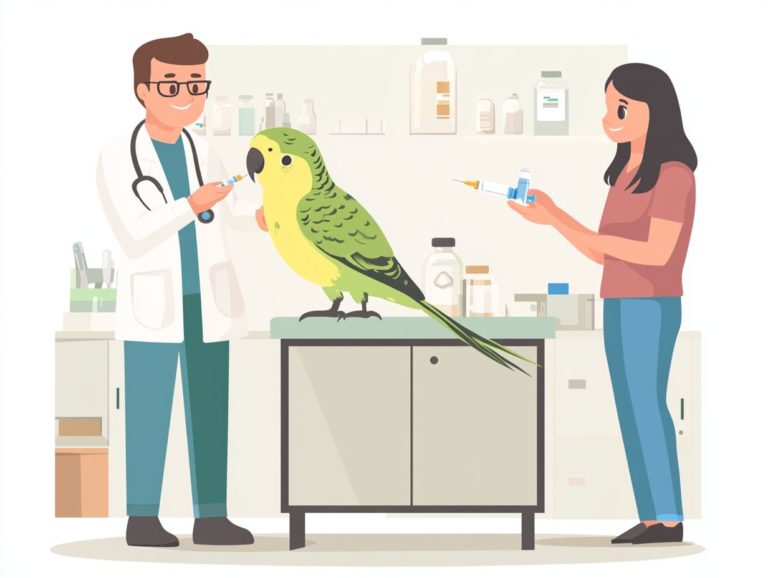How to Overcome Fear of Handling Birds?
Many bird enthusiasts derive immense joy from their feathered companions. Yet for some, the idea of handling these delightful creatures can evoke anxiety, particularly if they suffer from ornithophobia, or a fear of birds.
Understanding the fear of handling birds is crucial for the well-being of both the pet and the owner, especially when considering treatment methods that can alleviate anxiety. This article delves into the various causes and triggers of this fear, examining its impact on the relationship between you and your avian friend. It also discusses effective coping strategies to conquer it.
Additionally, this article explores how to build trust and recognize when it s time to seek professional help, such as therapy techniques from institutions like the Mayo Clinic, ensuring a harmonious bond with your beloved bird.
Contents
- Key Takeaways:
- Understanding the Fear of Handling Birds
- Impact of Fear on Bird Handling
- Overcoming the Fear of Handling Birds
- Building Trust with Birds
- When to Consider Therapy or Training
- Frequently Asked Questions
- What is the best way to overcome fear of handling birds?
- Why do some people have a fear of handling birds?
- Is it possible to overcome fear of handling birds on your own?
- Are there any techniques that can help in overcoming fear of handling birds?
- What should I do if I encounter a bird that triggers my fear?
- Can fear of handling birds be completely overcome?
Key Takeaways:
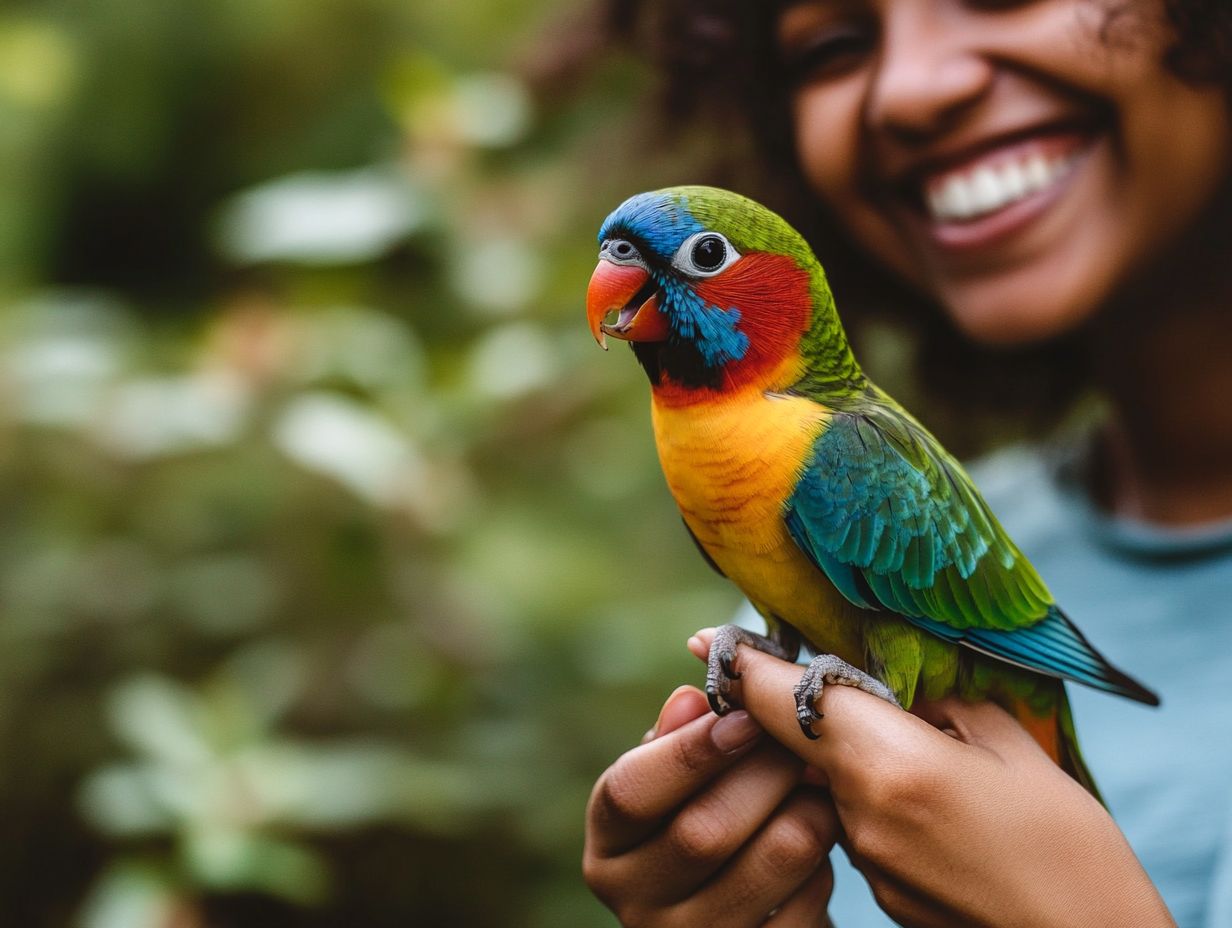
- Acknowledge the root cause of your fear to better understand and address it.
- Overcoming fear of handling birds is crucial for the well-being of both the bird and the owner.
- Building trust with birds and seeking professional help are key steps toward overcoming fear and developing a positive relationship with birds.
Understanding the Fear of Handling Birds
Understanding the fear of handling birds, called ornithophobia, is essential. This fear can trigger anxiety symptoms when you’re near them.
This phobia often stems from negative experiences. A startling encounter can leave you feeling overwhelmed or panicked, possibly leading to a panic attack.
If you find yourself struggling to overcome this anxiety, it can significantly impact your daily life, especially if you wish to connect with birds in a nurturing manner, like owning a pet bird, and utilizing self-exposure techniques.
Recognizing your triggers and the emotional responses that accompany them is the crucial first step in the treatment process, leading to helpful strategies to ease this fear, including cognitive behavioral therapy.
Causes and Triggers
The causes and triggers of ornithophobia the fear of birds can vary significantly from one person to another, often stemming from negative experiences or learned behaviors that may have developed during childhood.
For you, a childhood encounter might have set the stage. Perhaps a tense moment with a flock of aggressive geese or an unexpected dive-bomb from a crow left a lasting mark, leading to a specific phobia that can be addressed through therapy. Such formative experiences can instill a profound dread that evolves into anxiety disorders as you grow older, potentially requiring the help of a qualified therapist or treatment center like Stanford University.
Negative portrayals of birds in media may intensify these fears, creating a need for exposure therapy to counteract the effects of misinformation. As a result, your relationship with birds could become increasingly strained, leading you to adopt avoidance behaviors that disrupt your daily life perhaps steering clear of parks or outdoor gatherings where birds may linger, further perpetuating your anxiety.
Impact of Fear on Bird Handling
The influence of fear on bird handling can profoundly affect both you and your feathered companion, potentially resulting in both parties experiencing anxiety symptoms. This dynamic can create a cycle of anxiety symptoms and avoidance behaviors, potentially culminating in panic attacks during your interactions with birds. Don t let fear hold you back! Seek help to enjoy your time with your feathered friends to the fullest.
Consequences for Bird and Owner
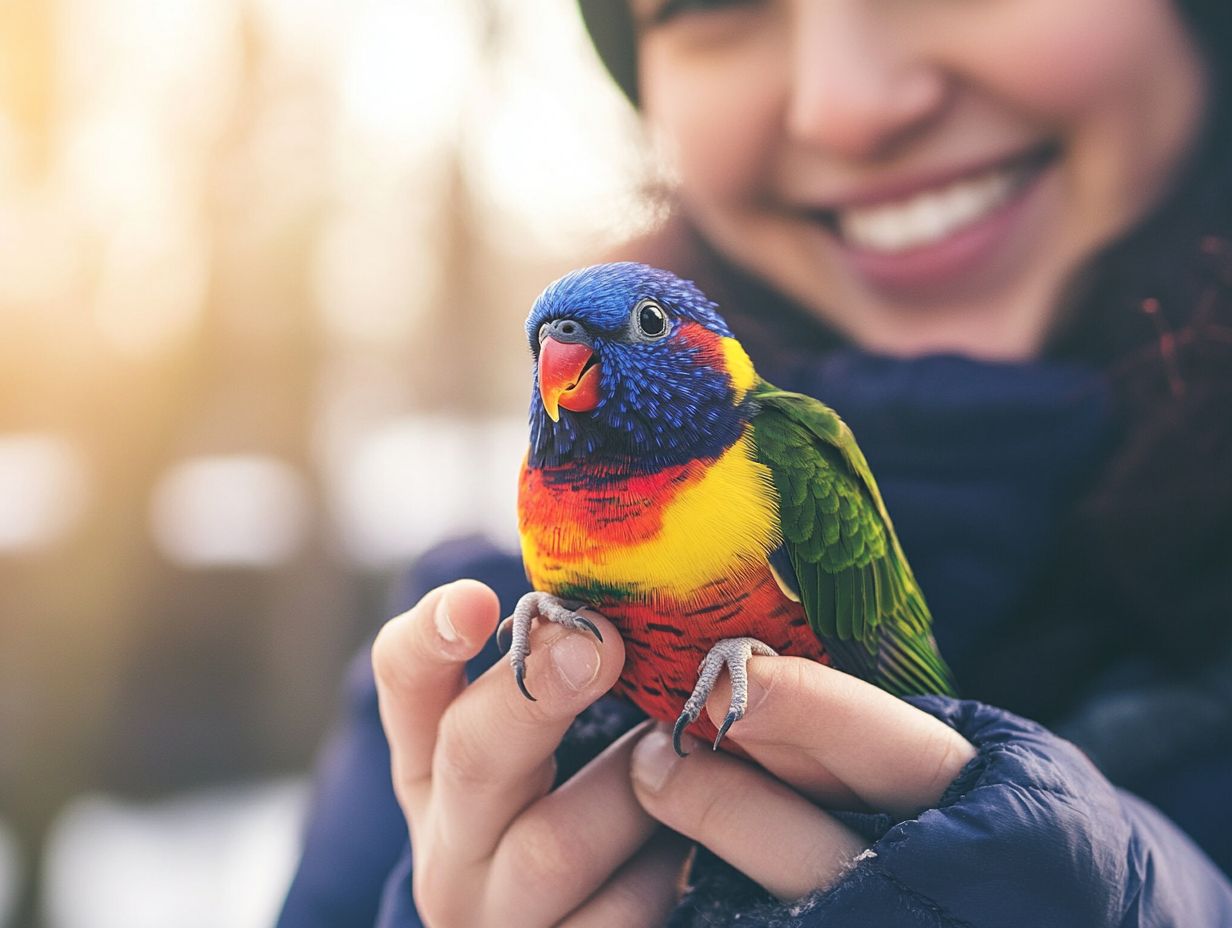
The consequences for both you and your bird can be significant. Your anxiety symptoms may hinder your ability to care for your pet properly, leading to stress for the bird and aggravating your own fear.
This neglect can show up in various ways through improper feeding, a lack of socialization, or inadequate habitat maintenance. These factors only intensify the emotional turmoil you experience and increase the need for behavioral techniques.
Your fears might create a cycle of avoidance. This not only impacts your well-being but also restricts your bird s chances for enrichment and interaction.
To tackle these challenges, treatment methods like cognitive behavioral therapy (CBT), which helps change negative thinking patterns, and exposure therapy can be invaluable in helping you confront and manage your anxiety. Incorporating relaxation techniques, such as deep breathing, can cultivate a more peaceful environment, ultimately benefiting both you and your feathered companion.
Overcoming the Fear of Handling Birds
Overcoming the fear of handling birds often requires a multifaceted approach. This blends therapeutic techniques like cognitive behavioral therapy, exposure therapy, and evidence-based practices. To learn more about the proper techniques, including how to safely handle a wild bird, these methods allow you to gradually confront your fears in a controlled and supportive environment.
Strategies and Techniques
Effective strategies for overcoming your fear of handling birds include:
- Exposure therapy
- Cognitive behavioral therapy
- Relaxation techniques like deep breathing
- Creating a fear hierarchy
To elevate these approaches, consider creating a fear hierarchy. This outlines your specific triggers in a structured manner. Start by listing situations that trigger your anxiety about birds, from the least frightening to the most distressing. This allows for gradual self-exposure.
Gradually exposing yourself to each level of this hierarchy helps you desensitize to your fears step by step. This approach is supported by numerous therapy techniques. By integrating CBT principles, like challenging negative thoughts about bird handling, you can significantly reshape your mindset and mitigate anxiety disorders.
Incorporating relaxation techniques into these therapies like mindful breathing exercises or visualization can help you cultivate a sense of calm. You might even explore anti-anxiety medications if necessary. This makes confronting your fears feel less overwhelming and more manageable.
Building Trust with Birds
Building trust with birds can be an exciting journey. It is crucial for overcoming the fear of birds and fostering a positive relationship through therapist-directed exposure. This foundation not only paves the way for enjoyable interactions but also cultivates mutual understanding. It enriches your experience with these remarkable creatures and allows for deeper engagement in nature programs.
Developing a Positive Relationship
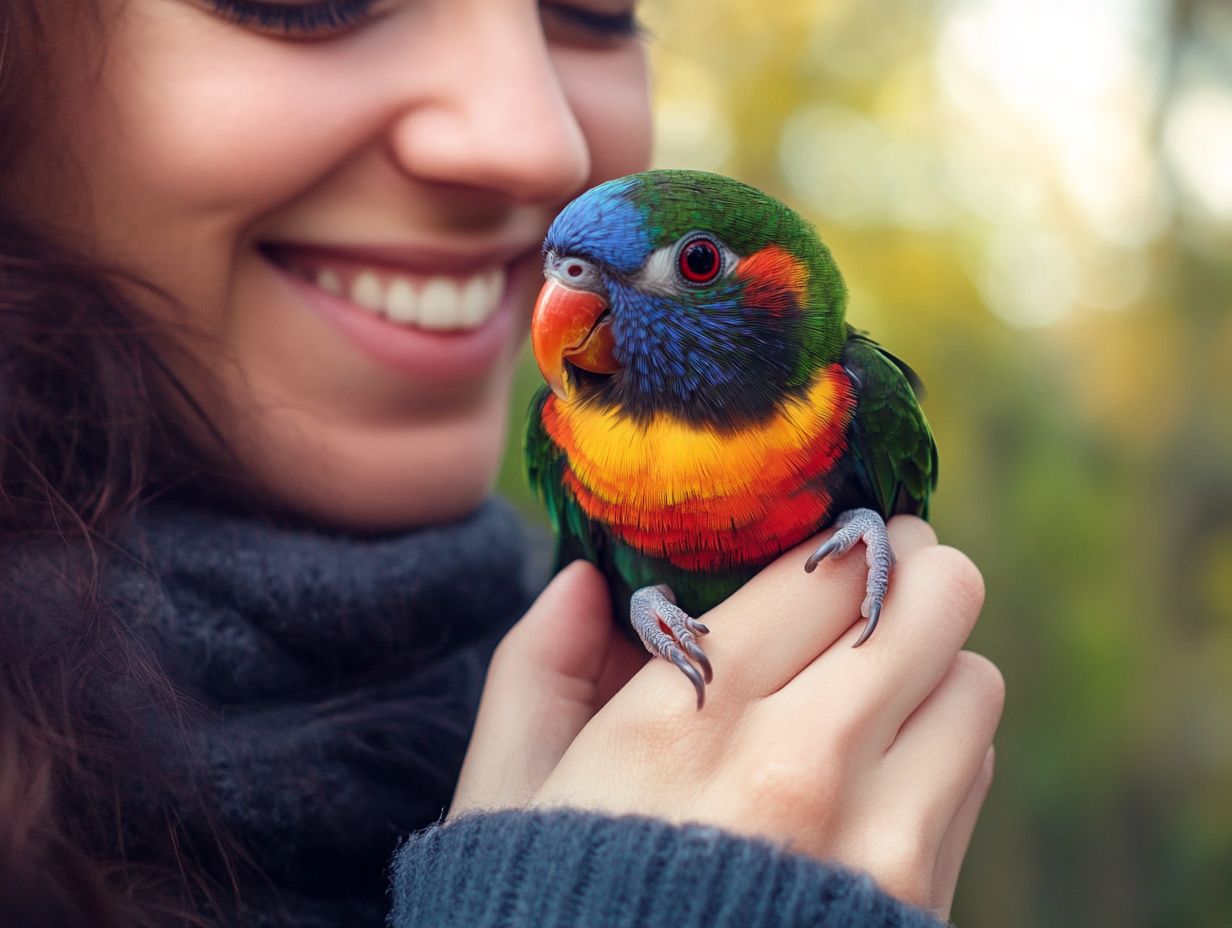
Developing a positive relationship with birds requires patience, understanding, and consistent strategies that build trust and comfort. These strategies often include techniques learned from professionals.
To embark on this journey, engage in regular interactions with birds. Gradually cultivate familiarity while employing behavioral techniques recommended by experts. Being mindful of your body language is essential. Understanding how birds communicate through their movements can greatly enhance your connection with them and reduce anxiety.
Incorporating relaxation techniques can help alleviate the anxiety that often accompanies the fear of birds. Practices like deep breathing or mindfulness meditation can keep you calm during encounters. This makes it easier to approach birds with an open mindset and engage in positive interactions.
Ultimately, these steps set the foundation for a more harmonious relationship with these captivating creatures, ensuring you can enjoy nature’s beauty without fear.
Take the first step today towards overcoming your fears and building a fulfilling relationship with birds!
When to Consider Therapy or Training
Seeking professional help can be a crucial step in overcoming ornithophobia, especially through established organizations like Kaiser Permanente and the Mayo Clinic. You have access to a range of therapy options, including effective treatment methods like cognitive behavioral therapy and exposure therapy, delivered by certified professionals at esteemed institutions such as Kaiser Permanente and Stanford University.
You should seriously consider therapy or training if your fear of birds is significantly disrupting your daily life, especially if you experience anxiety symptoms. Professional help can be invaluable in managing your symptoms and developing effective coping strategies, particularly when utilizing evidence-based practices.
This discomfort often reveals itself through constant anxiety. Just the thought of encountering birds can lead to overwhelming distress, making it essential to have a comprehensive treatment plan. You might find yourself avoiding certain situations, like changing your daily routes to steer clear of parks or outdoor spaces, which can heighten your sense of isolation.
In more severe instances, panic attacks can leave you feeling trapped and helpless, underscoring the importance of professional intervention. Recognizing these signs is essential as they indicate that your fear may have escalated beyond your control, warranting immediate action.
Engaging in therapy can provide you with structured support tailored to your unique needs, employing a variety of techniques to address your specific phobia. It fosters a safe space where you can explore these emotions and implement effective coping techniques, ultimately helping you restore a sense of normalcy and well-being while improving your overall quality of life.
Frequently Asked Questions
What is the best way to overcome fear of handling birds?
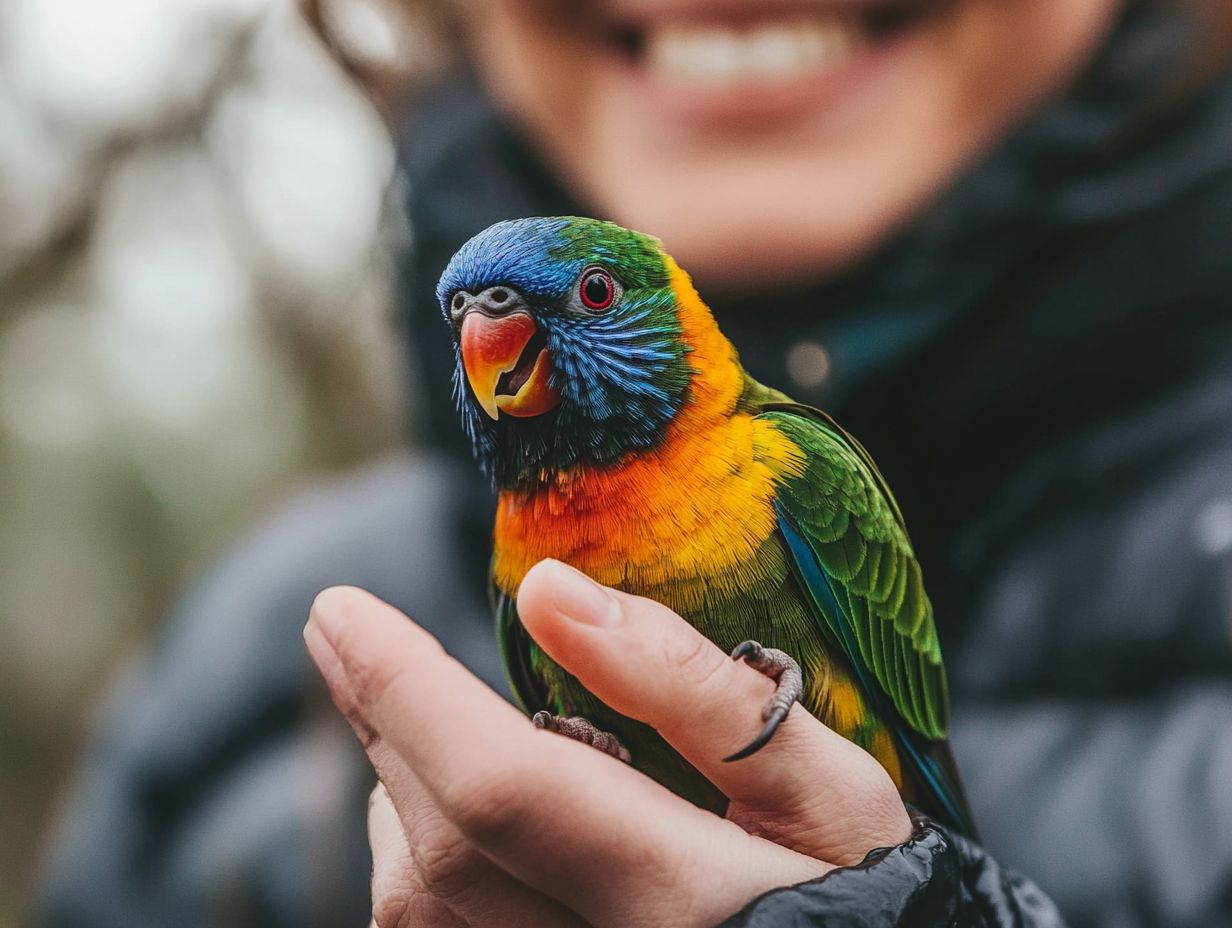
The best way to overcome fear of handling birds is to gradually expose yourself to them in a controlled and safe environment. Start by observing birds from a distance and slowly move closer as you become more comfortable. For more guidance, consider learning the best way to handle a bird with the help of a professional bird handler or trainer to guide you through the process.
Why do some people have a fear of handling birds?
Fear of handling birds can stem from various reasons, such as a previous negative experience, lack of exposure, or a general fear of animals. Misinformation and negative stereotypes about birds can also contribute to this fear.
Is it possible to overcome fear of handling birds on your own?
Yes, you can overcome fear of handling birds on your own, but it may take longer and require more effort. Be patient with yourself; progress takes time! Taking small steps towards facing your fear and seeking support from friends and family can be beneficial.
Are there any techniques that can help in overcoming fear of handling birds?
Yes, several techniques can help you overcome your fear. Some effective methods include:
- Deep breathing
- Positive visualization
- Desensitization therapy
It’s important to find the technique that works best for you and to practice it consistently.
What should I do if I encounter a bird that triggers my fear?
If you encounter a bird that triggers your fear, stay calm and remove yourself from the situation if possible. Take deep breaths and try to rationalize your fear. Remember that the bird is most likely not a threat and that you are in control of your fear.
Can fear of handling birds be completely overcome?
Yes, many individuals successfully manage their fear of handling birds through a combination of professional therapy and personal strategies. While complete eradication of the fear may vary from person to person, it is possible to significantly reduce and manage it. With patience, practice, and support, most people can overcome their fear and develop a healthy relationship with birds.
Take the first step towards overcoming your fear today; reaching out for help can make all the difference!

